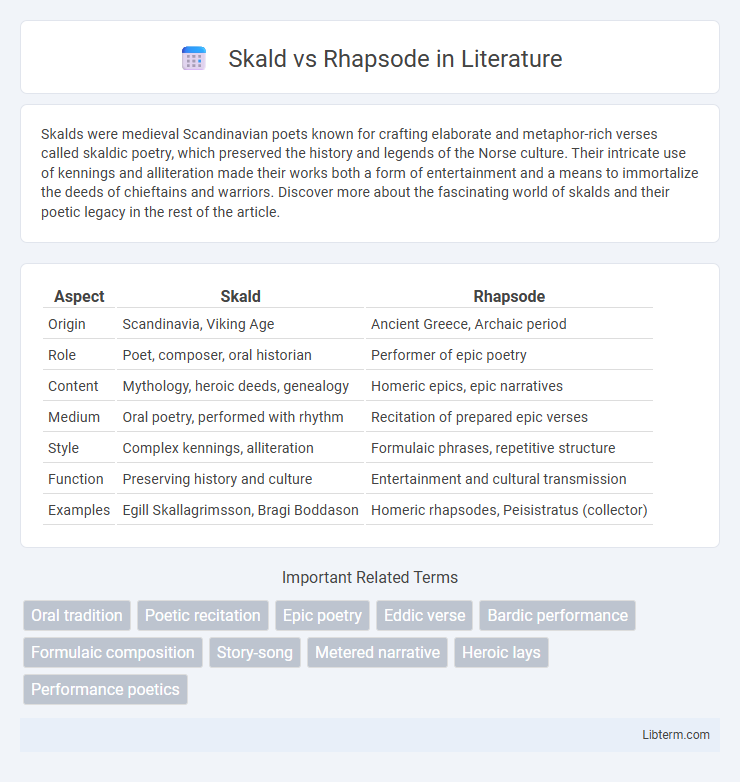Skalds were medieval Scandinavian poets known for crafting elaborate and metaphor-rich verses called skaldic poetry, which preserved the history and legends of the Norse culture. Their intricate use of kennings and alliteration made their works both a form of entertainment and a means to immortalize the deeds of chieftains and warriors. Discover more about the fascinating world of skalds and their poetic legacy in the rest of the article.
Table of Comparison
| Aspect | Skald | Rhapsode |
|---|---|---|
| Origin | Scandinavia, Viking Age | Ancient Greece, Archaic period |
| Role | Poet, composer, oral historian | Performer of epic poetry |
| Content | Mythology, heroic deeds, genealogy | Homeric epics, epic narratives |
| Medium | Oral poetry, performed with rhythm | Recitation of prepared epic verses |
| Style | Complex kennings, alliteration | Formulaic phrases, repetitive structure |
| Function | Preserving history and culture | Entertainment and cultural transmission |
| Examples | Egill Skallagrimsson, Bragi Boddason | Homeric rhapsodes, Peisistratus (collector) |
Introduction to Skalds and Rhapsodes
Skalds were Norse poets known for composing intricate verses that praised heroes and preserved historical events in Old Norse culture. Rhapsodes, emerging from ancient Greek tradition, were professional performers who memorized and recited epic poetry, especially Homer's Iliad and Odyssey. Both figures played crucial roles in oral storytelling, with skalds emphasizing lyrical complexity and rhapsodes focusing on narrative delivery.
Historical Origins and Cultural Context
Skalds were Norse poets active during the Viking Age, composing intricate verses that preserved the achievements and genealogies of Scandinavian chieftains, reflecting the oral tradition of medieval Iceland and Norway. Rhapsodes, originating in ancient Greece, performed epic poetry such as Homer's Iliad and Odyssey, serving as both entertainers and custodians of Hellenic cultural heritage through oral recitation. These figures exemplify distinct historical contexts: Skalds anchoring Norse identity through skaldic poetry's complex meter and kennings, and Rhapsodes shaping Greek collective memory with episodic storytelling in public performances.
Roles in Society
Skalds in Norse society were esteemed poets and historians who composed and recited epic verses to preserve history and honor gods and heroes, often serving at royal courts. Rhapsodes in ancient Greece functioned as professional performers who memorized and delivered Homeric epics, reinforcing cultural values through oral tradition in public festivals and civic gatherings. Both roles were crucial in maintaining oral literature and shaping collective memory, with Skalds emphasizing lineage and mythic narrative, while Rhapsodes focused on communal identity and entertainment.
Performance Styles and Techniques
Skalds performed Norse epic poetry using intricate alliteration and complex kennings, often accompanied by harp or lyre, emphasizing oral tradition and mnemonic devices to aid storytelling. Rhapsodes in ancient Greece specialized in reciting Homeric epics with rhythmic variations and formulaic phrases, relying on repetition and improvisation to engage audiences in open-air settings. Both performance styles utilized musical elements and poetic formulas to enhance memorability and emotional impact, yet Skaldic poetry tended toward elaborate, compressed syntax while Rhapsodic delivery favored clarity and accessibility.
Language and Poetic Forms
Skald poetry, rooted in Old Norse tradition, employs complex kennings and strict meter patterns like drottkvaett, emphasizing intricate alliteration and internal rhyme. Rhapsode performances in ancient Greece utilize dactylic hexameter, a more fluid and epic poetic form suited for oral recitations of Homeric epics. The Skalds' language is dense and symbolic, often cryptic, while Rhapsodes favor a narrative clarity designed to engage and inform their audience.
Instruments and Accompaniments
Skalds primarily used the harp or a similar stringed instrument called the kinnor to accompany their poetic recitations, emphasizing intricate melodies that complemented their Norse epic narratives. Rhapsodes, in contrast, often performed a cappella or with minimal accompaniment, such as simple rhythmic clapping or occasional lyre strumming, focusing on the oral delivery of Homeric epics in ancient Greece. The distinct instrumental approaches highlight the Skald's integration of musical complexity versus the Rhapsode's emphasis on vocal storytelling.
Notable Skalds and Famous Rhapsodes
Notable Skalds include Egill Skallagrimsson, celebrated for his complex and vivid verses in the Icelandic sagas, and Bragi Boddason, considered the earliest known skald whose poetry influenced Norse culture. Famous Rhapsodes, such as Homer, were masters of oral storytelling in ancient Greece, renowned for epic works like the Iliad and the Odyssey that shaped Western literary tradition. Both Skalds and Rhapsodes served as vital cultural preservers through their distinct poetic and narrative forms.
Themes and Subject Matter
Skalds primarily composed poetry centered on heroic deeds, Norse mythology, and the praise of kings and warriors, emphasizing themes of honor, valor, and the divine right of rulers. Rhapsodes specialized in the oral recitation of epic poetry like Homer's Iliad and Odyssey, focusing on themes of fate, human struggle, and the intervention of gods in mortal affairs. Both traditions underscore the importance of storytelling in preserving cultural values and history, but Skaldic verse is often more personal and encomiastic, while Rhapsodic performances highlight universal human experiences through narrative epics.
Legacy and Influence on Literature
The Skald were medieval Scandinavian poets whose complex kennings and formal structure profoundly influenced Old Norse literature and preserved Viking history through oral tradition. Rhapsodes, ancient Greek epic poets, played a crucial role in shaping Western literary tradition by performing and transmitting Homeric epics, which established foundational narratives and stylistic conventions for epic poetry. Both Skalds and Rhapsodes significantly impacted cultural heritage, inspiring subsequent generations of poets and contributing to the development of national literary identities.
Modern Interpretations and Revivals
Modern interpretations of Skalds emphasize their role as storytellers blending history and poetry, while Rhapsodes are reimagined as performers specializing in epic recitations with improvisational elements. Contemporary revivals often incorporate multimedia presentations and interactive performances to engage audiences, highlighting the adaptability of these ancient traditions. Academic and theatrical communities collaborate to preserve and reinterpret Skaldic and Rhapsodic practices, ensuring their relevance in modern cultural discourse.
Skald Infographic

 libterm.com
libterm.com